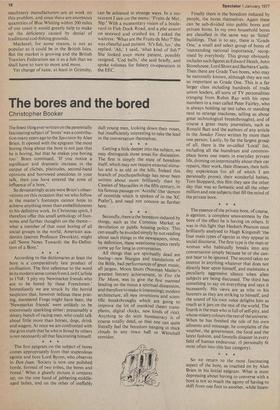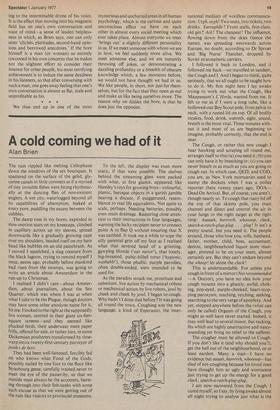The bores and the bored
Christopher Booker
The fi nest thing ever written on the perennially fascinating subject of 'bores' was a contribution many years ago to the Spectator by Alan Brien. It opened with the epigram 'the most boring thing about the bore is not just that he is boring, but that he makes you boring too.' Brien continued, 'If you notice a significant and dramatic increase in the output of clichés, platitudes, second-hand opinions and borrowed anecdotes in your talk, then you have entered the zone of influence of a bore.'
So devastatingly acute were Brien's obser vations on this occasion that we who follow in the master's footsteps cannot hope to achieve anything more than embellishments to his definitive work. In Christmas spirit, I therefore offer this small anthology of foot notes and further thoughts on the theme— what a member of that most boring of all social groups in the world, American academics (patron Professor Dworkin), might call 'Some Notes Towards the Re-Definition of a Bore.'
According to the dictionaries at least the bore is a comparatively late product of civilisation. The first reference to the word in its modern sense comes from Lord Carlisle in 1768: 'I pity my Newmarket friends who are to be bored by these Frenchmen.' Immediately we are struck by the horrid suspicion that, however tedious these prating, mannered Frogs might have been, the 'Newmarket friends' were unlikely to be enormously sparkling either: presumably a dreary bunch of racing men, who could talk about little more than horses, dogs, drink and wagers. At once we are confronted with the grim truth that he who is bored by others is not necessarily all that fascinating himself.
The first epigram on the subject of bores comes appropriately from that stupendous egotist and bore Lord Byron, who observes in Don Juan, 'Society is now one polished horde, formed of two tribes, the bores and bored.' What a ghastly picture it conjures up, on the one hand of jabbering middleaged ladies, and on the other of ineffably dull young men, looking down their noses, but insufficiently interesting to take the lead in the conversation themselves.
Getting a little deeper into the subject, we may distinguish three areas for discussion. The first is simply the state of boredom itself, which may not require external stimulus and is as old as the hills. Indeed this branch of psychopathology has never been written about more brilliantly than by Cassian of Marseilles in the fifth century, in his famous passage on 'Accidie' (the 'demon of noontide which is spoken of in the XC Psalm'), and need not concern us further here.
Secondly, there is the boredom induced by things, such as the Common Market or devolution or public housing policy. This can usually be avoided simply by not reading about such things in the newspapers, since, by definition, these wearisome topics rarely come up for long in conversation.
All things that are spiritually dead are boring—new liturgies and translations of the Bible, bad performances of great music, all jargon, Moon Shots (Norman Mailer's greatest literary achievement, in Fire On The Moon, was to give the first manned landing on the moon a spiritual dimension, and therefore to make it interesting), modern architecture, all new inventions and scientific breakthroughs which are going to improve the lot of mankind (heart transplants, digital clocks, new kinds of rice). Anything to do with bureaucracy is of course totally dead, so that one can quite literally feel the boredom hanging in thick clouds in any town hall or Whitehall corridor.
Finally there is the boredom induced by people, the bores themselves. Again these can be sub-divided into public bores and private bores. In my own household bores are classified in the same way as 'listed' buildings. That is to say, there is 'Grade One,' a small and select group of bores of 'outstanding national importance,' recognised by everybody. This group obviously includes such figures as Edward Heath, John Stonehouse, Lord Short and Barbara Castle. Then there are Grade Two bores, who may be nationally known, although they are not so important as Grade One. This is a far larger class including hundreds of trade union leaders, all sorts of TV personalities (ranging from Robin Ray with his opus numbers to a man called Peter Fairley, who is always holding up test tubes or standing next to strange machines, telling us about great technological breakthroughs), and of course a great many journalists, such as Ronald Butt and the authors of any article in the Sunday Times written by more than one person. Lastly, by far the largest group of all, there is the so-called 'Local' list, including all the humdrum and commonplace bores one meets in everyday private life, droning on interminably about their car repairs, their work, their illnesses, their holiday experiences 1(to all of which I am personally prone), their wonderful babies, Tom Stoppard, this film they saw the other day that was so fantastic and all the other million and one subjects that fill the mind of the private bore.
The essence of the private bore, of course, is egotism, a complete unawareness by the bore of the effect he is having on others. It was in this light that Hesketh Pearson once brilliantly analysed to Hugh Kingsmill 'the four main types of egotist as they appear in social discourse. The first type is the man or woman who habitually breaks into any conversation simply because he or she cannot bear to be ignored. The second takes no interest in anything whatever that does not directly bear upon himself, and maintains a peculiarly aggressive silence when alien subjects are being discussed. The third has something to say on everything and says it incessantly. His views are as trite to his listeners as they are striking to himself, and the sound of his own voice delights him as much as it jars on the rest of the world. The fourth is the man who is full of self-pity, and whose misery colours the rest of the universe.
When he has finished the tale of his own ailments and misusage, he complains of the weather, the government, the food and the latest fashion, and foretells disaster in every field of human endeavour. (1 personally fit most often into this last category).
So we return to the most fascinating aspect of the bore, as touched on by Alan Brien in his initial epigram. What is most depressing about having to converse with a bore is not so much the agony of having to shift from one foot to another, while listen ing to the interminable drone of his voice. It is the effect that moving into his magnetic field has on one's own conversation and state of mind—a sense of leaden helplessness in which, as Brien says, one can only utter 'clichés, platitudes, second-hand opinions and borrowed anecdotes.' If the bore himself is a man (or woman) so entirely cocooned in his own concerns that he makes not the slightest effort to consider their interest for other people, his most terrifying achievement is to induce the same deadness in his listeners, so that after conversing with such a man, one goes away feeling that one's own conversation is almost as flat, stale and unprofitable as his.
We thus end up in one of the most mysterious and uncharted areas in all human psychology, which is the curious and quite unconscious effect we have on each other in almost every social meeting which ever takes place. Almost everyone we meet 'brings out' a slightly different personality in us. If we meet someone with whom we are in love, we feel suddenly more alive. We meet someone else, and we are instantly throwing off jokes, or demonstrating a dazzling profundity or a breadth of obscure knowledge which, a few moments before, we would not have thought we had in us. We like people, in short, not just for themselves, but for the fact that they open us out and make us like being ourselves more. The reason why we dislike the bore, is that he does just the opposite.























































 Previous page
Previous page